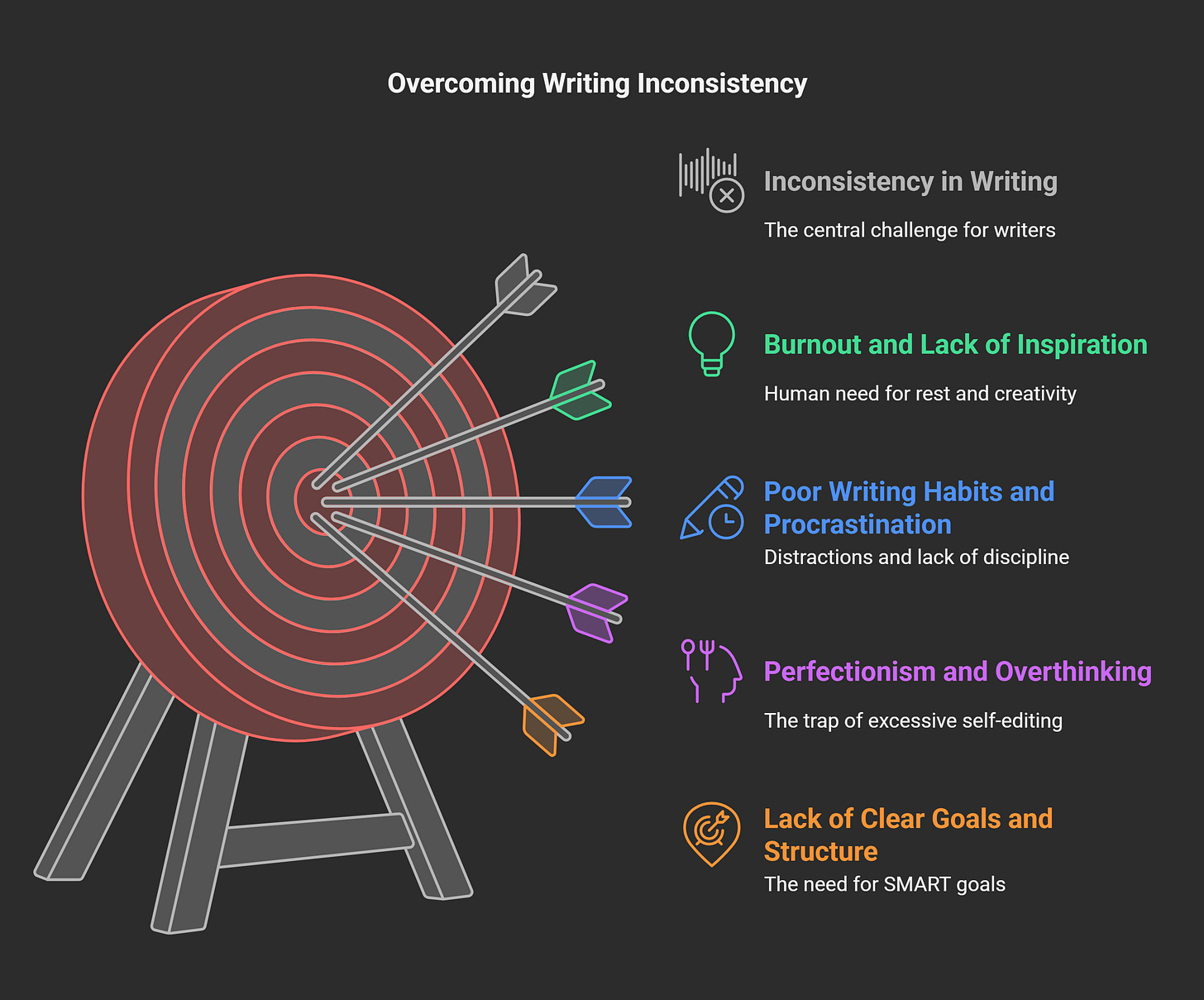Inconsistency Is Killing Your Writing Dreams - Here's How to Fix It
4 Key causes of inconsistency and practical strategies to build a daily writing habit.
Introduction
How are you doing? Have you finished the post you started yesterday? Not yet? But it is already Tuesday. Oh, are you going to finish it tomorrow? Only 500 words? You said you wanted to write a 1000-word post. What happened?
I don’t want to make you feel guilty.
We all get through this, and by Friday most of the writers plan the next big post they will start on Monday, because weekend is weekend. They need rest, to regain their energy and have a good start.
Why does this happen?
You are not lacking in talent. Your content ideas are awesome. It is just the inability to show up every day and put some words on a blank page. There is one enemy in both worlds, real and digital, called consistency, the quiet killer of your writing dreams.
I have been there.
When I started writing on Medium, back in October 2023, I wrote daily for one week and then stopped. I wrote one post after two weeks, then I stopped again. This cycle has happened several times since then.
Though, why is it hard for writers to be consistent? More than that, how can you fix it?
In this post, I will show you what the main causes of inconsistency in writing and practical ways you can approach and overcome inconsistency.
What are the main causes of inconsistency in writing?
Lack of clear goals and structure
Perfectionism and overthinking
Poor writing habits and procrastination
Burnout and lack of inspiration
Did I miss any? Yes, I did! But these are the most common.
Let’s take them one by one.
1. Lack of clear goals and structure
It took me a while to understand as a writer, you need clear goals.
What are your writing goals? When you sit and start writing, what do you want to achieve? How do you want to achieve? Do you have a map of what you want to write?
I stopped writing several times, because I didn’t have clear writing goals.
In time, once I started setting clear goals, my writing career transformed. This is why I managed to post more than 230 stories and articles on Medium, used them as a portfolio and landed a gig on Upwork that brought me a few grands since then.
The idea is to create SMART writing goals.
Instead of saying “I want to write”, say “I want to write a post that’s 500 words, daily, at 10 am”. It is specific, you can measure it, it is achievable, it is relevant, and of course, time-bound.
2. Perfectionism and overthinking (overediting)
I used to pride myself on being a perfectionist.
Want a clear example of perfectionism? When I first started using Grammarly, I would never publish a post until I had cleared up any errors I was notified about. Imagine that.
Neil Gaiman said, "The first draft is just you telling yourself the story."
Overediting is part of perfectionism. I already dedicated a whole post for that, and I will probably write more about it, until people understand that their job as a writer is to write, not to edit.
Remember what Anne Lamot said: “shitty first draft”.
3. Poor writing habits and procrastination
One of my best sessions of procrastination was when I wanted to create the perfect productivity system in Notion. Guess what? I spent more than two hours trying to create that, and I ended up deleting Notion out of my PC and phone.
If you want to track your progress, don’t complicate it.
If you want to build a writing habit, again, don’t complicate it. Have a simple system. I know research shows it takes about 66 days to form a new habit. I don’t like that. You can build it faster if you want.
One solution is to build it through “habit stacking”.
It is that concept of attaching the habit you want to create to something you already do. For example, start writing while your coffee is brewing, and until you finish drinking it (assuming you are a real coffee drinker and you don’t drink coffee as if it were water).
Another solution would be this 30-day writing challenge I created.
You can take it directly from the link, or for free if you upgrade your subscription. It is a challenge that will help you build a writing routine, along with a separate brainstorming and editing routine.
4. Burnout and lack of inspiration
Let me tell you something. You are not a robot. You are human.
This is why plan and take breaks. And be intentional with that. Work for 45 minutes, take a 15-minute break, repeat, then take a 30-minute break. Burnout is real. Lack of inspiration comes when you are not well rested.
If you get burnout, you will stop being consistent for sure.
Conclusion:
Consistency is real. So does inconsistency.
But if you
Have clear and structured goals
Avoid perfectionism and overthinking
And take necessary breaks
You can’t fail. More than that, you can become the consistent writer you want to be.
What can you do starting from now?
Be more aware of the causes of inconsistency
Implement every actionable tip I added in this post.
Build a writing habit with this 30-day writing challenge
Or allow me to guide you.
What else is stopping you from being a consistent writer?
If you find this useful, let others know about it by sharing and restacking it. It takes only 5 seconds to do it. I would appreciate it!


